Matthew Herper in Stat:
 Could a blood test detect cancer in healthy people? Grail, a Menlo Park, Calif.-based company, has raised $1.6 billion in venture capital to prove the answer is yes. And at the world’s largest meeting of cancer doctors, the company is unveiling data that seem designed to assuage the concerns and fears of its doubters and critics. But outside experts emphasize there is still a long way to go. The data, from a pilot study that Grail is using to develop its diagnostic before running it through the gantlet of two much larger clinical trials, are being presented Saturday in several poster sessions at the annual meeting of the American Society of Clinical Oncology. The data show that the company’s test can detect cancer in the blood with relatively few false positives and that it is fairly accurate at identifying where in the body the tumor was found. Another abstract seems to show that the test is more likely to identify tumors if they are more deadly. One big worry with a cancer blood test is that it would lead to large numbers of patients being diagnosed with mild tumors that would be better off untreated.
Could a blood test detect cancer in healthy people? Grail, a Menlo Park, Calif.-based company, has raised $1.6 billion in venture capital to prove the answer is yes. And at the world’s largest meeting of cancer doctors, the company is unveiling data that seem designed to assuage the concerns and fears of its doubters and critics. But outside experts emphasize there is still a long way to go. The data, from a pilot study that Grail is using to develop its diagnostic before running it through the gantlet of two much larger clinical trials, are being presented Saturday in several poster sessions at the annual meeting of the American Society of Clinical Oncology. The data show that the company’s test can detect cancer in the blood with relatively few false positives and that it is fairly accurate at identifying where in the body the tumor was found. Another abstract seems to show that the test is more likely to identify tumors if they are more deadly. One big worry with a cancer blood test is that it would lead to large numbers of patients being diagnosed with mild tumors that would be better off untreated.
…Grail is running a preliminary study called the Circulating Cell-Free Genome Atlas (CCGA), which is being conducted in 15,000 patients. The goal from the beginning was to use this study to optimize a diagnostic test. This would then be tested in two more studies: one of 100,000 women enrolled at the time of their first mammogram, and a second of 50,000 men and women between the ages of 50 and 77 in London who have not been diagnosed with cancer. These huge studies are one reason Grail has raised so much money. But the data being reported at the ASCO meeting are from a tiny sliver of that first study: an initial analysis of 2,301 participants from the training phase of the sub-study, including 1,422 people known to have cancer and 879 who have not been diagnosed. These data are being used to pick exactly what test Grail will run.
More here.
